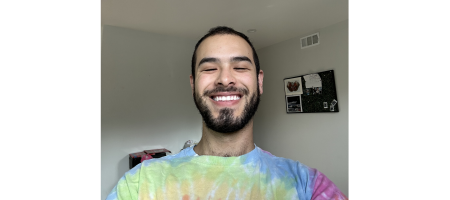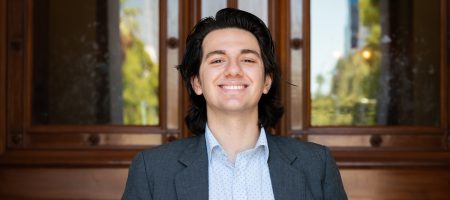Student Spotlight – Diego Mesa
Meet UCLA undergraduate researcher Diego Mesa!
Diego Mesa majors in Gender Studies, minors in Environmental Systems and Society, and is in our Mellon Mays Undergraduate Fellowship Program (MMUF)! The title of his project is “Magic and Futurity: Uncovering the Queer in the Hated Homosexual in Giovanni’s Room.” They hope that their research sheds light on the problem that is homonormativity. His best piece of advice for students thinking about doing research is to absolutely do it!
How did you first get interested in your research project?
I read this novel when I was in community college in my LGBTQ literature class. The whole time I felt a deep identification with the character of Giovanni, whom the main character David falls in love with. Throughout the novel, David’s reflections on his identity are projected in a manner that romanticizes the validity to be normative in his society. This factor deeply affects his relationship with Giovanni, whose tragic end is evident in a society that could not cope with his queer magnificence. This story was maddening to read, as I felt that even in a world far more accepting than the one in the novel, the narrative of David is played over and over. Queer characters whose ability to blend into heteronormative society may at times give them permission to traumatize those who can not in the process.
What has been the most exciting aspect of your research so far?
I think the most exciting part has been the process that occurs besides my research. I have loved the mentorship far more because it makes my project a collaborative project. I deeply believe that creation is a concert of multiple folks, and to see my project develop with the feedback, support, and ideas of others add layers to my project I could have never come up with on my own.
What has surprised you about your research or the research process?
How easy and how hard it is. It is a queer paradox in my opinion. I say easy because the skill set that you develop through mentorship makes gargantuan stressors manageable. The hard part is doing the research at the same time as life, and student life at that, is happening. It is a constant agreement of time management between your classes and your project, but fortunately the things that make it easier are those skills you learn with your peers.
What is one piece of advice you have for other UCLA students thinking about doing research?
Absolutely do it. Research functions very differently than the regular academic years in undergrad. I feel like I have a much clearer vision for my future thanks to pursuing this path, and in many ways feel better prepared to take on big projects.
What effect do you hope your research has in your field, at UCLA, in your community, or in the world?
I hope my research sheds light on the problem that is homonormativity. That is, in the process of being inclusive of queer identities society erases the very aspects that make us special, different, and resilient. It is a project of unearthing the internalized hate that exists in many of us, and I’m hoping that my project adds to the same narrative contemporary authors are proposing. This means giving importance to our emotions, feelings, and other affective archives that are just as formative and productive for society as is reason.



